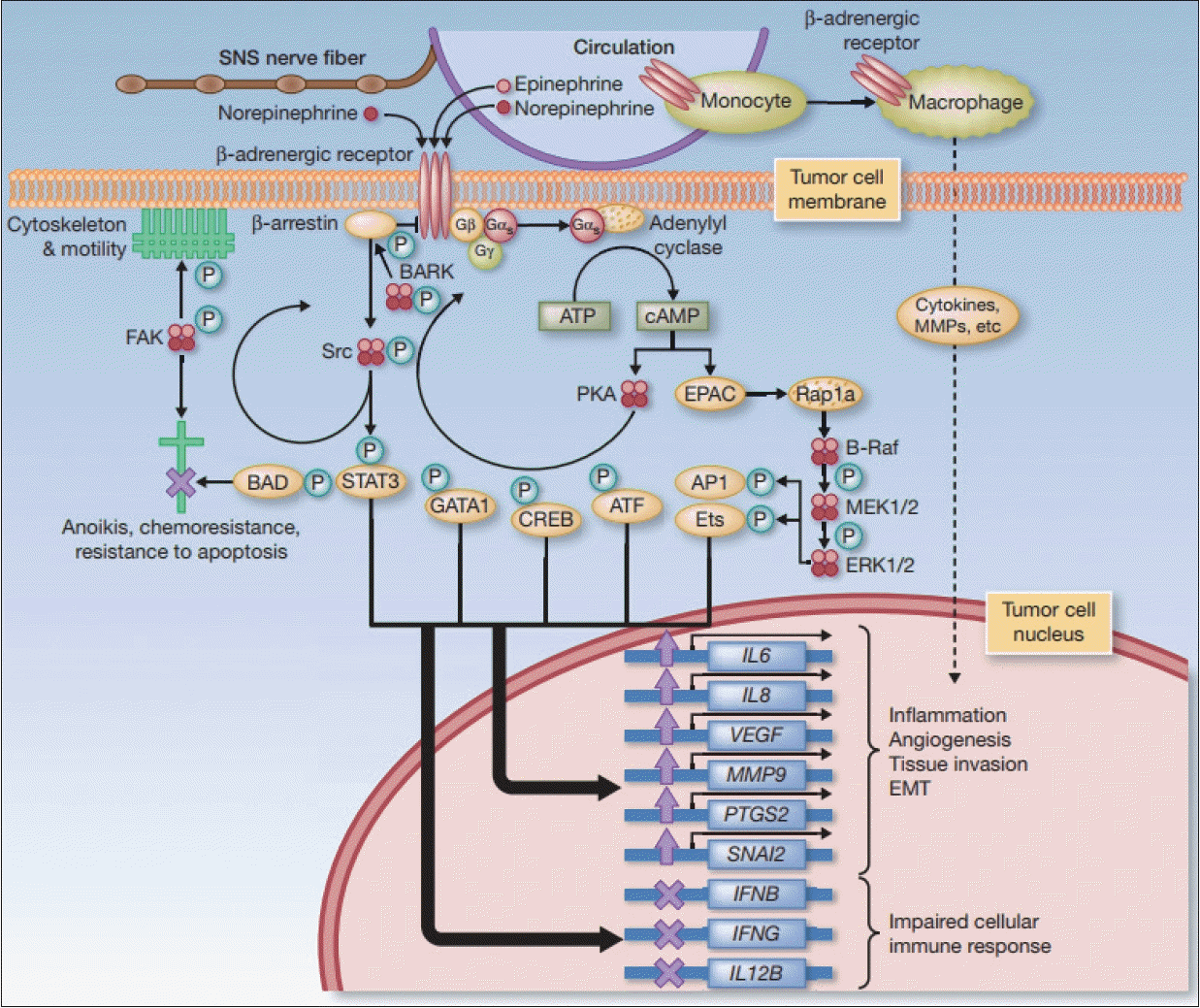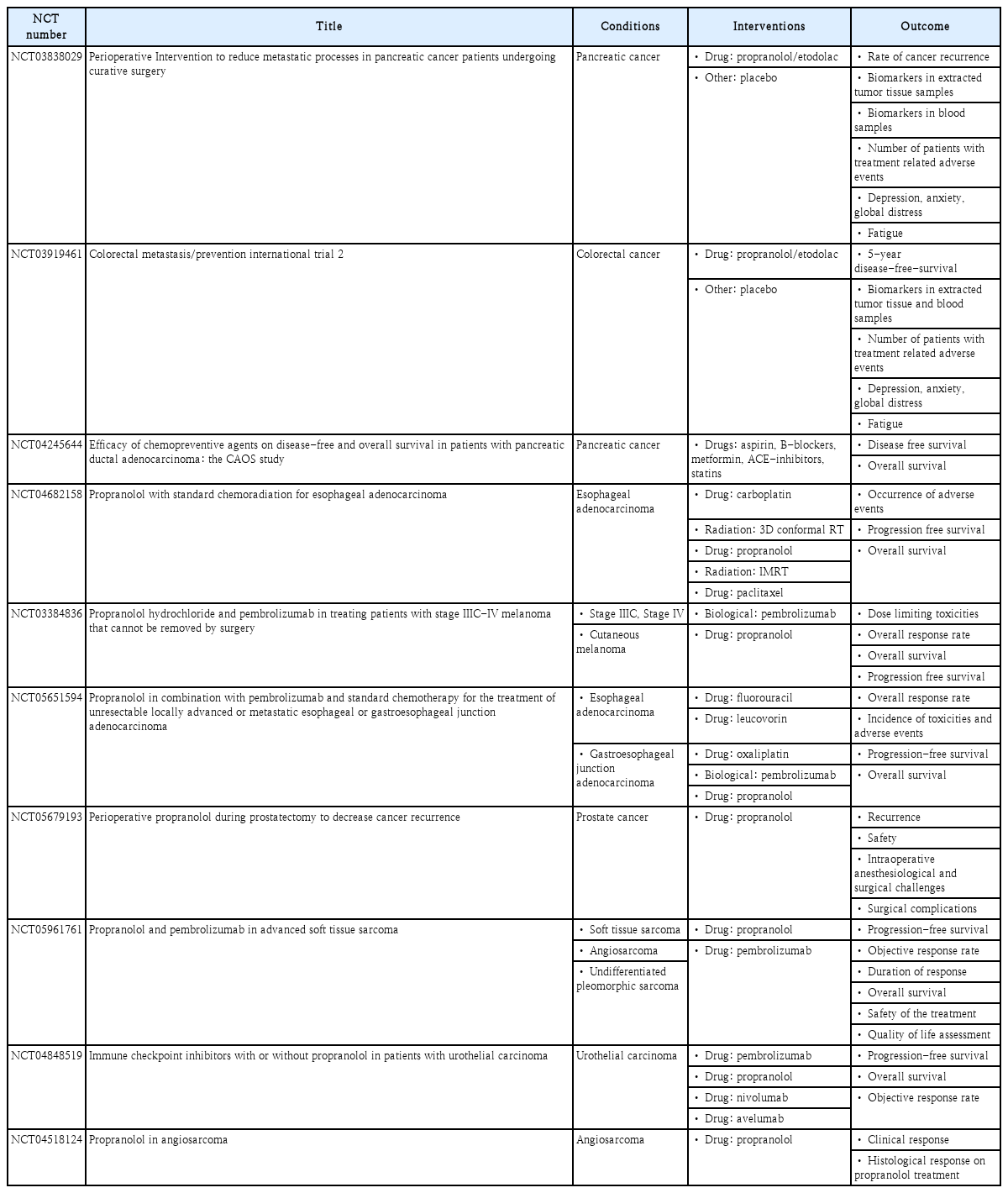두경부암에서의 카테콜아민(에피네프린/노르에피네프린)과 베타차단제의 역할
The Role of Catecholamines (Epinephrine/Norepinephrine) and Beta Blocker in Head and Neck Cancer
Article information
Trans Abstract
Beta blockers are used for various indications, particularly cardiac arrhythmias, cardioprotection after myocardial infarction, hypertension, migraine, tremor, and anxiety disorders, by inhibiting the sympathetic actions of catecholamine hormones (i.e., epinephrine and norepinephrine). This sympathetic mechanism occurs via beta-adrenergic receptors. Recently, experimental evidence showed that malignant cell lines express beta-adrenergic receptors and that sympathomimetic neurotransmitters may affect carcinogenesis through these receptors. These neurotransmitters are suggested to have a major impact on secondary tumor growth and to contribute to metastasis, induction of angiogenesis, and tissue invasion. Given that beta-blockers are considered safe, cheap, and effective, the potential beneficial effects of their use for cancer would be of interest. However, evidence from epidemiological and clinical studies has been inconclusive. Especially the effect of beta-blockers on head and neck cancer has rarely been investigated.
서 론
두경부암은 연간 약 60만 명의 새로운 환자가 발생하고 있으며, 전 세계 악성종양 발생률 7위를 차지하고 있다. 다양한 치료방법의 개선과 수술기법이 발전하고 있지만 5년 전체 생존율은 54.7%-65.9%로 지난 몇 년간 크게 개선되지 않았다[1].
베타차단제(beta blocker)는 심혈관질환(고혈압, 심근경색 예방, 부정맥), 편두통, 진전, 불안 장애와 같은 다양한 영역의 치료에 널리 사용되어 온 약물이다. 급성 또는 만성 스트레스가 발생시 교감-부신-수질 축(sympathetic-adrenal-medullary axis, SAM axis)이 활성화되어 에피네프린(epinephrine), 노르에피네프린(norepinephrine), 도파민(dopamine) 같은 교감신경 전달물질의 합성이 일어나게 된다. 베타차단제는 베타-아드레너직 수용체(beta-adrenergic receptor)를 통해 교감신경 전달물질인 에피네프린, 노르에피네프린, 도파민의 작용으로 일어나는 교감신경 항진 작용을 억제한다[2].
2000년대 후반 이후로 다양한 암종에서 베타차단제에 의한 항암 효과에 대한 가능성이 연구되기 시작했다. 세포 실험에서 다양한 암세포는 베타-아드레너직 수용체를 발현하고 스트레스시 증폭되는 노르에피네프린과 같은 물질이 이러한 수용체를 통해 암세포의 증식을 증폭시키고 베타차단제는 이러한 증식을 저하시킬 수 있을 가능성에 대해 보고되었다[3-6]. 해당 과정의 신호 전달 및 표적 치료가 될 수 있는 매커니즘에 대해 많은 연구가 있었다(Fig. 1) [7]. 하지만 임상에서의 연구는 베타차단제가 효과가 있다고 보고하는 논문들도 있고 뚜렷한 효과가 없다는 논문들도 있어 뚜렷한 결론이 나지는 않은 상황이다[8-10].
두경부암에 대한 베타차단제의 효과는 현재까지는 연구가 많이 되어 있지 않은 편으로 저자는 베타차단제가 두경부암에서도 효과가 있을 수 있다는 가설을 세우고 해당 주제에 대해 연구를 수행한 바 있다[11,12]. 두경부암은 수술적 치료를 초치료로 하는 경우가 많은데 진행성 두경부암에 대한 수술은 상대적으로 시간이 많이 걸리고 난이도가 높아 하루에 많은 수술을 하기 힘든 측면이 있다. 따라서 진단 후에도 빠른 일정으로 수술을 할 수 없는 경우가 많은데 진단 후 한 달 이상의 기간이 경과하여 수술을 하면 검사 당시보다 더 진행된 병변을 경험하는 경우가 종종 있다. 또한, 진행성 두경부암 진단을 받은 환자들은 본인 상태에 대한 불안감이 커지는 경향이 많다. 베타차단제가 수술 전까지 환자에게 심리적인 불안감을 경감시키는 데 도움을 줄 뿐만 아니라 진단 후 수술 전까지 종양의 진행을 늦출 수 있다는 가설을 세우고 연구를 지속하기 위해 노력하고 있다. 본론에서는 현재까지 두경부암에 대한 베타차단제의 효과에 대해 진행된 연구들에 대해 고찰하고자 한다.
본 론
기초 연구
현재까지 두경부암에서 베타-아드레너직 수용체, 교감신경 전달물질(에피네프린, 노르에피네프린), 베타차단제의 역할을 연구한 실험 논문은 대부분 구강암에서 이루어져 왔다[13-19]. Shang 등[13]의 연구자들은 65명의 구강암 환자 중 44명(44/65, 67.7%)이 베타2-아드레너직 수용체의 발현이 메신저 RNA (mRNA), 단백질 수준에서 나타났다고 보고했다. Bernab´e 등[14]의 연구자들은 구강암 환자의 검체 전부(20/20, 100%)에서 베타2-아드레너직 수용체의 발현이 메신저 RNA (mRNA), 단백질 수준에서 나타났다고 보고했다. 노르에피네프린과 베타작용제(beta agonist)인 isoproterenol에 의해 구강암 세포가 증식하고 베타차단제인 propranolol에 의해 구강암 세포 증식이 부분적으로 억제된다는 것을 실험적으로 입증했다. 또한 노르에피네프린과 베타작용제(beta agonist)인 isoproterenol에 의해 interleukin-6 (IL-6) 같은 사이토카인의 발현이 증가하여 암세포 성장이 일어날 가능성을 제시하였다.
브라질의 연구에서는 106명의 모든 구강암 환자들의 검체에서 베타2-아드레너직 수용체의 발현이 면역염색에서 나타났는데 베타2-아드레너직 수용체가 강한 발현을 나타내는 환자들(77명, 72.6%)이 베타2-아드레너직 수용체가 약한 발현을 보이는 환자들(29명, 27.4%)과 비교하여 통계적으로 유의하게 음주/흡연을 적게 하고(8.3% vs. 34.3%, p=0.014) 낮은 T 병기(T1/2 vs. T3/4 = 34.5% vs. 63.6%, p=0.007)를 나타내는 경향이 관찰되었다. 따라서 베타2-아드레너직 수용체가 강한 발현을 나타내는 환자들이 생존율도 높은 것이 관찰되어 베타 아드레너직 수용체의 강한 발현이 향후 새로운 항암 전략의 표적이 될 수 있음을 제시하였다[15].
Xie 등[17]의 연구자들은 2015년에 구강암 세포주를 이식한 누드마우스를 이용한 동물 실험에서 스트레스 환경에 노출이 많이 된 그룹일수록 혈액 내 에피네프린, 노르에피네프린의 수치가 높으며 구강암 크기가 증가한다는 것을 확인하였다. 또한 스트레스 환경에 노출이 많이 된 구강암 동물 모델일수록 매트릭스 메탈로프로테이나제-2 (matrix metalloproteinase-2, MMP-2)와 혈관 내피 성장인자(vascular endothelial growth factor, VEGF) 같은 사이토카인의 발현이 높아진다는 것도 보여주었다. 베타-아드레너직 수용체는 베타1, 베타2, 베타3로 세분되는데 베타1-아드레너직 수용체는 주로 심장에서 관찰되며, 70%-80%를 차지한다. 베타2-아드레너직 수용체는 대부분 폐 기관지와 골격근의 동맥에 위치한다. 베타3-아드레너직 수용체는 주로 지방 조직에 위치하며 지방 분해 및 열 생성을 조절하는 데 참여한다[2]. 해당 연구진들은 후속 연구를 통해 다양한 베타 아드레너직 수용체(베타1, 베타2, 베타3)의 발현 중 구강암 세포주와 조직에서 베타2-아드레너직 수용체의 발현이 높다는 것도 보여주었다. 노르에피네프린에 의해 구강암 세포가 증식하고 침습적으로 변하는데 베타2차단제에 의해 이러한 변화가 억제된다는 것을 보여주었다. 구강암 세포주를 이식한 누드마우스를 이용한 동물 실험에서도 노르에피네프린 주입으로 증폭된 구강암의 성장이 베타2차단제에 의해 억제된다는 것도 보여주었다. 이 연구에서는 노르에피네프린이 세포외 조절 단백질 키나아제(extracellular regulated protein kinase)와 cyclic adenosine monophosphate (cAMP)-반응 요소 결합 단백질(cAMP-response element binding protein)의 인산화(phosphorylation)를 촉진하여 세포 증식과 침습을 유도하고 베타2차단제에 의해 이 경로를 억제하면 노르에피네 프린에 의한 구강암 세포의 증식과 침습을 억제할 수 있다는 것을 제시하였다[19]. Zhang 등[20]의 연구진은 구강암 세포에서 증식, 이동, 침습에 있어서 베타차단제에 의해서 억제 효과가 있는 것을 확인하였다. 베타차단제는 구강암 동소위 마우스 모델(orthotopic mouse model)에서도 구강암 증식을 억제하는 것으로 나타났다. 해당 연구에서는 베타차단제의 매커니즘이 미토겐 활성화 단백질 인산화 효소(mitogen activated protein kinase), (phosphoinositide 3-kinase/protein kinase B) 및 Ras 신호 경로의 변화와 관련이 있을 수 있다고 제시하였다.
구강암이외의 두경부암에서의 연구는 상대적으로 적은 편이다. 비인두암 세포주에서 노르에피네프린에 의해 매트릭스 메탈로프로테이나제-2, 9 (MMP-2, 9)와 혈관 내피 성장인자(VEGF)의 발현이 높아지고 베타차단제인 propranolol에 의해 감소한다는 것을 보여주었다[21]. Wolter 등[22]의 연구진은 다양한 두경부암 세포주들에서(구강암, 후두암, 하인두암) 베타2-아드레너직 수용체가 발현하고 베타2차단제가 다양한 두경부암 세포들의 성장을 억제하는 것을 보여주었다. p53 가족 단백질들과 혈관 내피 성장인자(VEGF)를 조절하여 세포사멸(apoptosis)을 유도한다고 주장하였는데 비선택적 베타차단제인 propranolol이 cisplatin과 결합하여 시너지 효과가 있고 방사선 조사 후 두경부암 세포의 생존능을 저하시킬 수 있다는 것을 보여주었다. 2021년에 발표한 저자의 기초 연구에서도 다양한 두경부암(구강암, 후두암, 인두암, 부비동암)에서 베타2-아드레너직 수용체가 발현이 관찰되었는데 다른 암종보다 구강암에서 발현이 높은 편이었다. 모든 두경부암 세포주에서 노르에피네프린의 농도가 높아질수록 세포의 생존능과 증식이 증가하는 것을 관찰할 수 있었고 베타차단제인 propranolol에 의해 억제되는 것을 관찰할 수 있었다[12]. 두경부암에 대한 기초 연구에서 베타 아드레너직 수용체 중 베타2-아드레너직 수용체의 발현에 대한 연구가 많이 되어 있는 상황이다. 베타차단제 중 대표적이고 많이 사용되는 것이 비선택적 propranolol이라 해당 약제를 이용한 연구가 많으나 베타2차단제에 대한 비교 연구가 필요하며 수용체별로 암의 진행 및 차단 기전에 대해 많은 연구가 필요할 것으로 보인다.
임상 연구
임상에서의 연구는 기초 연구보다는 활발하게 진행되지 않은 편으로 비교적 일관된 결과들을 보여준 기초 연구에 비해 임상에서의 연구는 결론이 뚜렷하지는 않은 상황이다. Bastos 등[23]은 두경부암 93명 및 구강 백반증 32명 환자들의 혈중 노르에피네프린 및 에피네프린 수치를 조사했을 때 구강암, 구인두암, 구강 백반증의 순서대로 혈중 노르에피네프린 및 에피네프린 수치가 통계학적으로 유의하게 높다는 것을 보여주었다. 93명의 두경부암 환자들에서 벡 불안척도(Beck Anxiety Inventory)로 측정한 불안 증상 중 진전(tremor) 증상이 있을수록 혈중 노르에피네프린 수치가 유의하게 높고 가슴 두근거리는(heart pounding/racing) 증상이 있을수록 혈중 에피네프린 수치가 유의하게 높았다. 이 연구를 통해 두경부암 환자들이 교감신경 과잉행동의 성향을 보인다는 것을 알 수 있다. 대만의 인구 코호트 연구에서는 베타차단제를 복용하는 군이 복용하지 않는 군에 비해 두경부암 발생이 감소한다는 것을 보고하였다(위험비[hazard ratio]: 0.58; 95% 신뢰구간 [confidence interval]: 0.35-0.95) [24]. 반면 한국의 1274명의 두경부암 환자 코호트를 후향적으로 분석한 연구에서는 두경부암 진단 후 베타차단제를 투여한 환자일수록 생존율이 낮다고 보고하였다[25].
2023년 9월 기준 현재 미국 임상시험처(ClinicalTrials.gov)에 등록되어 진행 중인 베타차단제를 이용한 암 치료에 대한 임상시험들을 정리하였다(Table 1). 다른 암종들에서 베타차단제를 이용하여 항암 효과를 살펴보는 임상시험들이 많았지만 두경부암에 대한 임상시험은 진행되지는 않는 상황이었다. 향후 임상시험에서 발표되는 결과에서 긍정적인 결과가 나온다면 두경부암에서의 연구에도 좋은 근거 자료가 될 것이다.
결 론
현재까지의 많은 기초 연구들에서는 스트레스가 교감신경 전달물질인 노르에피네프린의 작용을 항진시켜 두경부암의 증식에 영향을 줄 수 있고 베타차단제는 이러한 증식을 억제할 가능성을 시사하고 있다. 하지만 임상에서의 연구는 부족한 편으로 향후 관련하여 좀 더 연구가 필요한 상황으로 생각된다.
Acknowledgements
This work was supported by the National Research Foundation of Korea (Grant number, NRF-2017R1C1B1008842).


